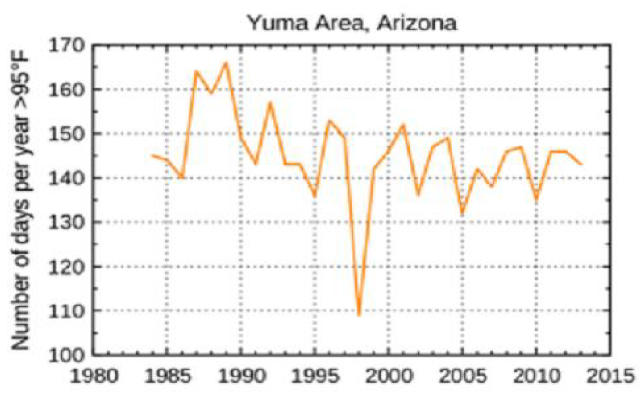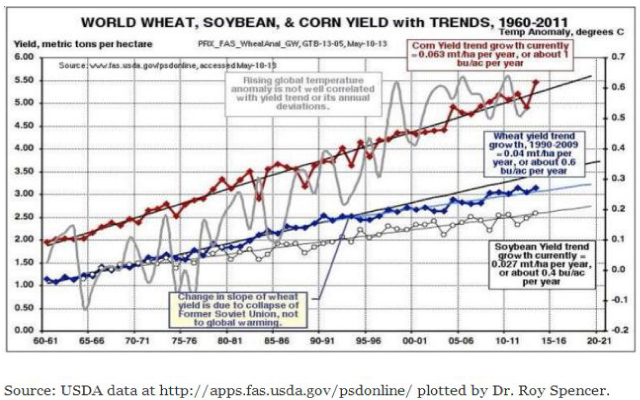
Once again, as H. L. Mencken warned, the Arizona Daily Star is trying to scare us with a front-page story saying that global warming will fry us. The story, by Tony Davis, is “Rising AZ temperatures make for hostile environment.” The lead line is “Thousands more Arizonans will likely die. Farmers’ crop yields will drop. Electricity bills will rise sharply, along with the use of air conditioning.”
This article is about a new report, “Risky Business” by a group of business leaders and politicians lead by former New York Mayor, Michael “Big Gulp” Bloomberg. The report is based upon a series of computer model projections about the climate. I have shown in a previous ADI article “Failure of climate models shows that carbon dioxide does not drive global temperature” that computer model projections diverge widely from reality.
One of the major contentions of “Risky Business” is that the number of days with temperatures over 95 F will greatly increase, thereby causing more heat-related deaths. The models assume that increased carbon dioxide emissions over at least the last 30 years have caused and will cause major warming. Well, let’s see how these models have been doing so far.
Sierra Rayne, writing at American Thinker, takes the report to task. Rayne presents two interesting figures.
The first shows that only 11 percent of the 212 climate sub-regions have statistically significant increasing trends in the number of extremely hot days over the past 30 years.
While Tony Davis says we will fry, it seems that the number of days over 95 in Yuma is decreasing:
Ken Haapala, Executive Vice President, Science and Environmental Policy Project (SEPP) opines:
“The Title of the report: ‘Risky Business: The Economic Risks of Climate Change in the United Sates – A Climate Risk Assessment for the United Sates’ sounds impressive. However, the quality of the research is summed up in the opening paragraph. ‘Our research combines peer-reviewed climate projections through the year 2100 with empirically derived estimates of the impact of projected changes in temperature, precipitation, sea levels, and storm activity on the U.S. economy.’ In short, ‘Risky Business’ is a continuation of the drum-beat of climate alarmism found in the Summary for Policymakers of Physical Science volume of UN the Intergovernmental Panel on Climate Change (IPCC) Fifth Assessment Report (AR-5).”
About crop yields:
“The optimum growth temperatures of several plants have already been demonstrated to rise substantially with increasing levels of atmospheric CO2. It is clear that the beneficial effects of
elevated atmospheric CO2 on agricultural crop yields are often significantly enhanced by elevated air temperatures. In a future world of higher atmospheric CO2 concentrations, wheat
crops should be better able to withstand the stress of potentially higher temperatures, suffering less damage and producing greater yields.” Source “Interactive Effects of Temperature and Enhanced Co2 on Agricultural Crops” We can see that yields of important crops like wheat, soybeans, and corn have been rising along with temperature and carbon dioxide.
Heat-related deaths:
Several papers show a declining death rate from heat-related deaths as the planet warms. “Climate change may have relatively little influence on heat-related deaths,… it appears that changes in other factors that influence vulnerability of a population are dominant instead of temperature trends and that the level of adaptability to high ambient temperatures may be large.”
Electricity costs:
I agree that electricity costs will rise, but not necessarily from more use. The cost of electricity is rising because governments (including Arizona) are mandating use of much-more-expensive and unreliable wind and solar energy to replace fossil-fuel-generated electricity. See “Five reasons Arizona should repeal its renewable energy standards mandate.”
Polls show that public interest in global warming is very low, and that is worrisome to government policy makers and crony capitalists purveying alternative energy schemes. The government and fellow-traveling press need articles such as that in the Star to stir up public concern.
“The whole aim of practical politics is to keep the populace alarmed (and hence clamorous to be led to safety) by menacing it with an endless series of hobgoblins, all of them imaginary.” – H. L. Mencken



